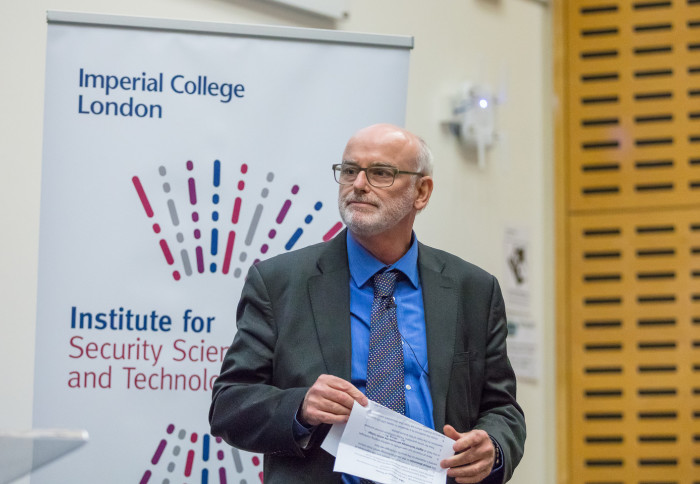Professor Bill Lee reflects on his time as ISST Co-Director

Professor Bill Lee joined Imperial in 2006, becoming the ISST Co-Director in 2017. As he retires from Imperial he reflects on his time with the ISST.
I joined ISST as Co-Director in July 2017. It was clear to me that our external engagement was good, with ISST and Chris Hankin initiating many national programmes, such as Academic RiSC and the UK Intelligence Community Postdoctoral Research Fellowships, with significant influence on Government. However, internally in College we needed to do more. So working closely with our Advisory Board we developed a Business Plan to provide a step change in ISST capabilities. The appointments of Max and Jane as Communications Officer and ISST Manager respectively had already started the process.
Chatting to all the heads of Engineering and Natural Sciences departments revealed (perhaps understandably) many had little idea of security-related research in their own departments let alone across College. Nonetheless, enough did that we were able to set up the Champions Group of academics/researchers from each department to help spread the word about ISST and security opportunities. This group meets every couple of months for an update on ISST and research calls from a Co-Director, a technical talk from a Champion and general networking. In 2018 we set up the Champion’s fund with £10K/annum available to support Early Career Researchers initiate small research projects in topical areas with potential for growth.
The ISST manager, Jane Lac, came up with the idea of running a series of Breakfast Briefings in key topics to get (bleary) academics, industry and Government people together for a networking and knowledge exchange event. There have been excellent ones in Quantum Technology, Big Data, Fintec and medical device security to name but a few. We’ve also increased our communications more broadly, improving our digital content and outreach with expanded networks (Affiliates, Champions, External contacts), and knowledge gathering of research opportunities and calls for proposals.
This increased internal engagement has enabled ISST to become more aware of those at Imperial involved in security and defence research and so to help coordinate it across the College faculties and departments.
ISST also needed to make the student body more aware of the security field and its opportunities for research and jobs, and initiating our MSc in Security and Resilience has really helped in this respect. Bill Proud and Jane have worked tirelessly to set it up and, supported by the outstanding teaching staff (Peter Biggins, Margaret Wilson, John Hassard, Deeph and others,) we have developed an MSc programme which I have no doubt will be enormously successful in providing well informed graduates for the UK and overseas security sectors. The international nature of the first cohort has extended our (and their) vision to differing perspectives in this complex sector. Next year we will offer some MSc modules to undergraduates to further extend our reach across College. In addition, Deeph (ISST Co-Director) and PJ Beaghton (ISST Security Science Fellow) have linked into the Executive Education programme in the Business School and further expansion into this training sector is envisaged.
When I joined ISST in July 2017 we were recognised for our excellence in cyber security research but we needed to broaden our portfolio into other sectors. Often we have achieved this by finding pockets of excellence already present at Imperial, highlighting and raising awareness of what was already being done.
This has revealed and catalysed topics such as Fintec, sensor and detection technology (both with new College networks), robotics and drones, and matter, materials and manufacturing. It has also extended our knowledge of the medical sector and its security needs (now so topical with Covid-19). Improvements in our Governance structure now mean our Security Science Fellows (SSF) act as theme leads and new SSF appointments are planned to lead the Medical and Space sectors.
From late 2017 we worked closely with David Gann (then VP for Innovation at Imperial) to set up an initiative with DSTLs Defence and Security Accelerator (DASA) at our developing White City campus. This envisaged co-locating academics, Government and industry (including SME’s) to facilitate innovation in this sector. Deeph picked this up and aided by Zarine (ISST Special Projects Manager) rapidly put together the Defence and Security Cluster on the 4th floor of the Innovation-Hub building with DASA’s London Hub, Airbus, Saab, Smith and Northrop Grumman joining soon after. This has now extended into the ISST Innovation Ecosystem with other UK and global players and ISST enjoying a permanent presence at White City. These developments will enable ISST to support getting innovation into the increasingly complex security and defence sectors.
While all the above is good we did suffer one set back in my time with the Institute being unsuccessful with our bid to get an EPSRC Centre for Doctoral Training in Security Science and Technology at Imperial with Lancaster University and Kings College. This, however, should be revisited. Now we have a successful MSc in place, broader research capability, and the Innovation Ecosystem at White City, a proposal with suitable partner universities would be more likely to succeed.
Finally, the Covid-19 pandemic has highlighted the sorts of issues the future may bring, and that Governments will have to make difficult decisions, with massive consequences while working with multinational companies, to protect their communities from threats of all kinds. ISST will remain agile and able to support Imperials research efforts in addressing such security issues as they arise and in training the next-generation of leaders in the field.
Article text (excluding photos or graphics) © Imperial College London.
Photos and graphics subject to third party copyright used with permission or © Imperial College London.
Reporter
Max Swinscow-Hall
Institute for Security Science & Technology